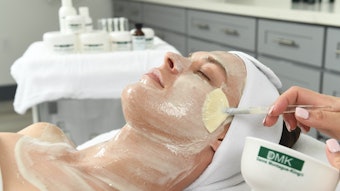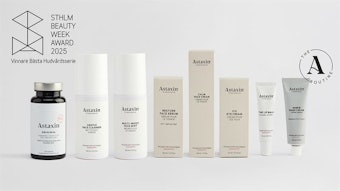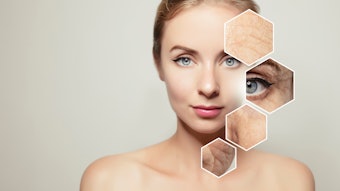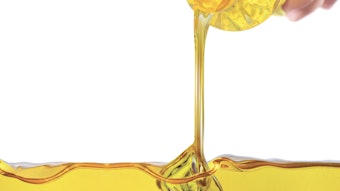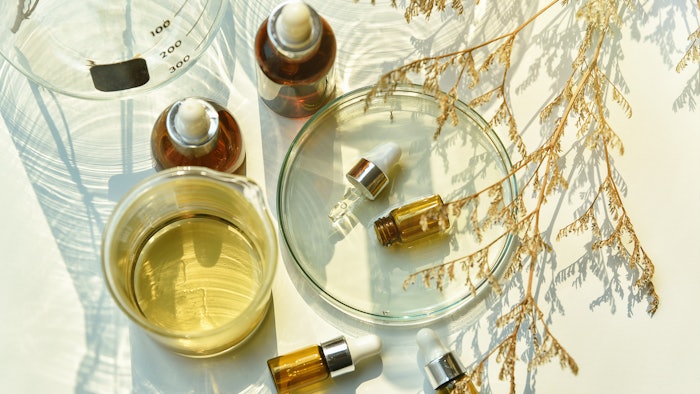
Ingredients 1001? Yep, at least 1001! If you’ve been in the beauty and wellness industry for any time at all, you’ve seen more than one article on ingredients. It seems to be a topic that has been covered at least a thousand times. Whether you've perused magazines, attended conferences, or scrolled through social media, discussions on ingredients pop up everywhere. And everyone, even the 13-year-old on TikTok is now an “expert” on ingredients. So, who’s right and what do we really need to know?
Let’s talk for a minute about why ingredients matter at all. I have been working with those suffering from medically reactive skin for over 15 years now and have learned quite a bit from my clients. When someone is diagnosed with a potentially fatal illness, they tend to look closely at their lives. What could they have done differently, and what should they be doing now to stay healthy in the future? More specifically, they ask, “How can I clean up my life?” It’s actually a great question that we all should ask ourselves every once in a while.
Based on my client’s skin care needs, my view on skin care ingredients has always been (way) to the far “clean” side. I learned a lot about our industry with some interesting interactions with skin care formulators and chemists.
Cleaning up your life means reducing your exposure to toxins. Look at what you come into contact with each day (or several times a day), that could potentially raise your toxin exposure and affect your health?
- Food and water
- Cleaning supplies (laundry, kitchen, cleaning, quats, etc.)
- Shampoos and body products
- Skin care products
- Nail care products
- Oral care
What is “Medically Reactive” Skin?
Before I can share the ingredient lists, I need to tell you who I had in mind when I researched good and bad ingredients.
The term "client" in the context of medically reactive skin doesn't exclusively refer to individuals undergoing cancer and cancer treatments. While this demographic is certainly one group that may experience medically reactive skin conditions, the concept extends to a much broader audience.
Clients with medically reactive skin can encompass individuals dealing with various health conditions (See U.S. Conditions Breakdown Sidebar).
U.S. Conditions Breakdown
Disorder Name How Many People Have It (as of 2023)
| Cancer and cancer causing treatments | 18 million |
| Autoimmune disorders | 30-50 million |
| Type 2 Diabetes | 50 million |
| Eczema | 31.6 million |
| Psoriasis | 8 million |
| Hormonal imbalances | 1 in 2 women |
| Allergies | 50+ million |
| Pregnancy | 5-6 million a |
| Environmental Changes | No stats available |
| Multiple medications | 27-200+ million |
Related: Skin Care Ingredients to Avoid Mixing
Why These Ingredients?
Toxicity expert, Dr. Yvonne Burkart, PhD, DABT says that there are hidden toxins in our everyday cosmetics that can “turn on” cancer genes inside the body. She did a medical study with humans that had breast cancer. She asked them for 28 days just to stop using the personal care products they had been using, no other changes. When they tested them again, each one showed that the cancer genes had been turned off, and the tumors had been reduced.
This is why the selection of ingredients in our skin care needs to be a focus. And, what I love is once you know what is good and what should be avoided, it’s an easy way to reduce your exposure and toxic load.
Beneficial Ingredients For “Medically Reactive Skin”
Understanding the specific causes of medically reactive skin is crucial for developing personalized skin care routines and choosing products that minimize the risk of adverse reactions. Individuals with reactive skin should consult with dermatologists or skin care professionals for tailored recommendations based on their unique circumstances. The subsequent lists categorize ingredients based on their intended results, providing you with an overview of optimal choices. Finally, we will outline ingredients to steer clear of.
Anti-inflammatory Ingredients
These are your “calm and soothe” ingredients.
Calendula Extract. With anti-inflammatory and anti-bacterial properties, calendula extract is used to soothe and promote skin healing.
Frankincense Oil. This soothing, anti-inflammatory, skin strengthening oil improves tone and elasticity, while also reducing the appearance of wrinkles.
Organic Vanilla Extract. This extract is full of vitamins and antioxidants, and it’s anti-inflammatory and soothing. The scent is also known to calm nausea, anxiety and depression.
Jojoba Oil. This soothing, anti-microbial contains long lasting moisture benefits.
Hemp seed oil. This anti-inflammatory oil encourages new cell generation and reduces wrinkles.
Rosehip See oil. This anti-inflammatory and moisturizing oil contains vitamin A and C that help treat the signs of aging.
Vitamin E. This oil soothes, moisturizes and reduces itching
Rose Essential Oil. This anti-inflammatory, antioxidant, with vitamins and minerals that promote circulation, while moisturizing and inhibits pigmentation. Its scent is comforting and can relieve stress and depression.
Apricot Kernel Oil. This oil contains Amygdalin (a powerful phytonutrient) that moisturizes, protects and moisturizes. This oil may even prevent certain cancers.
Tamanu Oil. This oil is calming, soothing and promotes increased healing of wounds.
Peppermint Oil. This oil is cooling and contains anti-inflammatory properties that may help soothe irritated skin and reduce redness. It also has antimicrobial and analgesic properties that will combat bacteria and give relief for minor pain and aches.
Hydrolyzed Marine Collagen. Anti-inflammatory, hydration boosting collagen that supports skin hydration and elasticity, while improving mineral density and wound healing.
Chamomile Extract. Known for its anti-inflammatory and calming properties, chamomile helps soothe sensitive or irritated skin.
Green Tea Extract. Rich in antioxidants, green tea extract helps calm inflammation and protects the skin from environmental stressors.
Licorice Root Extract. Known for its anti-inflammatory properties, licorice root extract helps calm redness and irritation.
Oat Extract and Oat Kernel Oil. Oats contain compounds that have anti-inflammatory and moisturizing effects, making them beneficial for calming the skin.
Hyaluronic Acid. While primarily a hydrating ingredient, hyaluronic acid can also soothe the skin and reduce inflammation.
Allantion. This ingredient helps soothe and protect the skin, reducing inflammation.
Panthenol. Panthenol helps moisturize and soothe the skin.
Castor oil. Castor oil is anti-inflammatory, anti-fungal, moisturizing and has wound-healing properties.
Protecting Ingredients
Protecting the skin barrier is essential for maintaining healthy and resilient skin. Several safe ingredients are known for their ability to support and strengthen the skin barrier.
Ceramides. Lipids that occur naturally in the skin, ceramides help maintain the integrity of the skin barrier, preventing moisture loss and promoting hydration.
Fatty Acids. Essential fatty acids, such as omega-3 and omega-6, (jojoba oil, olive oil, cocoa butter) are crucial for maintaining a healthy skin barrier. They contribute to lipid synthesis and barrier function.
Cholesterol. Cholesterol is a key component of the skin barrier, helping to maintain its structure and function. It works in conjunction with ceramides and fatty acids (typically plant-derived).
Hyaluronic Acid. Known for its ability to retain water, hyaluronic acid helps keep the skin hydrated, contributing to a healthy skin barrier.
Niacinamide (Vitamin B3). Niacinamide has anti-inflammatory properties and helps improve the skin barrier. It can reduce redness, irritation and support overall skin health.
Shea Butter. Rich in fatty acids, shea butter provides nourishment and helps reinforce the skin barrier.
Zinc Oxide. Often used in sunscreens, zinc oxide provides a physical barrier against UV radiation, protecting the skin from damage that can compromise the skin barrier.
Moisturizing and Hydrating Ingredients
Medically reactive skin also needs additional hydration and moisturizing. There are numerous cosmetic ingredients known for their hydrating properties, helping to moisturize and nourish the skin.
Hyaluronic Acid. This ingredient attracts and retains moisture, keeping the skin hydrated.
Ceramides. Ceramides help to maintain the skin's natural moisture barrier.
Panthenol. This ingredient improves skin hydration and promotes healing.
Jojoba Oil. This oil mimics the skin's natural oils, providing hydration without greasiness.
Shea Butter. Shea Butter is rich in fatty acids, it moisturizes and nourishes the skin.
Squalane. Squalane moisturizes and enhances the skin's natural lipid barrier.
Olive oil. This oil is an occlusive that will hydrate and keep water in the skin.
Evening Primrose Oil. This ingredient contains omega-6 fatty acids and Linoleic acid that has been shown to prevent peeling and water loss, maintaining the skins hydration.
Notice that some of these are also on the anti-inflammatory list? Don’t we love ingredients that can multi-task? Yes!
Wound Healing Ingredients
Tamanu Oil. This oil is calming, soothing and promotes increased cell turnover and wound healing.
Calendula Extract/oil. This ingredient is anti-inflammatory and anti-bacterial properties and is soothing and promotes skin healing.
Zinc Oxide. Zinc oxide provides a protective barrier to support the body’s natural would healing.
Allantoin. Known for its soothing and skin-healing properties, allantoin helps promote cell regeneration and reduce inflammation.
Panthenol (Provitamin B5). This ingredient has moisturizing properties and supports skin regeneration. It is often used to improve skin barrier function and enhance wound healing.
Hyaluronic Acid. Hyaluronic acid helps maintain skin hydration and supports the skin's natural healing processes. It is often used to improve skin texture and elasticity.
Centella Asiatica (Gotu Kola). This ingredient contains compounds known as triterpenoids, which have been shown to promote collagen production and accelerate wound healing.
Vitamin E. This antioxidant helps protect the skin from damage. Vitamin E also supports the healing process by promoting cell regeneration.
Chamomile Extract. This extract is known for its anti-inflammatory and soothing effects, and aids in wound healing and reduce skin irritation.
Castor Oil. This oil is anti-inflammatory, anti-fungal, moisturizing and contains wound healing properties.
What To Avoid
While many claims of specific ingredients leading to cancer, like the ones above made by Dr. Yvonne Burkart, there are still many consumers and professionals who express concerns over cosmetic ingredients that could negatively impact health. These concerns are debated and have not been clearly substantiated, but here is a list of some ingredients to avoid and the reasoning as to why.
- PEG Compounds: Cancer, allergies, hives, eczema and irritation
- Hydroquinone: Cancer, developmental and reproductive toxicity
- Octoxynols: Cancer, toxicity and endocrine disruptor
- Sodium Laureth Sulfate: Cancer, allergies and immunotoxicity
- Ethyl Acetate: Cancer, neurotoxicity and organ system toxicity
- Aluminum: Cancer, skin irritation and immunotoxicity
- Petrolatum/Petrochemicals: Cancer, immunotoxicity and allergies
- Oxybenzone: Immunotoxicity, endocrine disruption and cellular changes
- Fragrance: Cancer, allergies, dermatitis, immunotoxicity and endocrine disruptor
- Phthalates: Cancer, allergies, toxicity and endocrine disruptor
- Triclosan: Lung irritant, organ system toxicity and endocrine disruptor
- Formaldehyde: Cancer, toxicity, immunotoxicity and endocrine disruptor
- DEA and TEA: Cancer, allergies and immunotoxicity
- Coal Tar Derivatives: Cancer, toxicity, allergies and immunotoxicity
- Parabens: Cancer and endocrine disruptor
- BHA and BHT: Cancer, allergies and endocrine disruption
- Phenols: Cancer and endocrine disruptors
Additional Resources:
- https://pathology.jhu.edu/autoimmune/prevalence/
- https://allergyasthmanetwork.org/allergies/allergy-statistics/
- https://www.kff.org/affordable-care-act/issue-brief/data-note-prescription-drugs-and-older-adults/
- https://nypost.com/2019/02/22/nearly-half-of-women-have-been-affected-by-a-hormonal-imbalance/
- https://davidsuzuki.org/living-green/dirty-dozen-cosmetic-chemicals-avoid/
- https://www.ewg.org/skindeep/
- https://www.cir-safety.org/ 8. https://www.youtube.com/watch?v=ZJnF99GfrC09. https://pubmed.ncbi.nlm.nih.gov/36746253/
Becky Kuehn serves as the visionary founder of Oncology Spa Solutions® and is the esteemed author of "Life Changing Esthetics®." Her core mission revolves around enlightening spa, salon, and medical professionals on how to alleviate the often devastating side effects of cancer treatments. She stands as the foremost, leading advocate and intermediary for estheticians trained in holistic and oncology practices, whether they work within hospital treatment centers or collaborate with oncology specialists.



